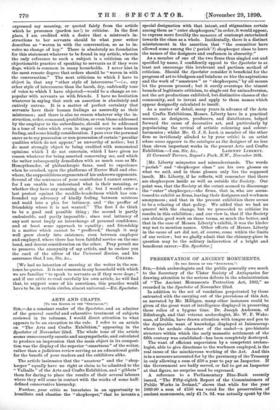DOMESTIC SERVICE.
LTO TEM EDITOR OF TIER " srzorrroe."1
Sra,—I rarely object to any criticisms which appear in your columns, as I know the editors of the Spectator hold the con- venient, if somewhat elastic doctrine, that criticisms on criticisms are inadmissible in the correspondence columns. But this week there appears, in the course of an article entitled "Domestic Service," such a travesty of the paper I wrote in the Universal Review, entitled "Maids—and their Critics," that I am compelled to ask you for a brief space in which to point out that your contributor has in no sense
expressed my meaning, or quoted fairly from the article which he presumes (pardon me !) to criticise. In the first place, I am credited with a desire that a mistress's in- structions to her servants should be what your writer describes as "woven in with the conversation, so as to in- volve no change of key." There is absolutely no foundation for this statement whatever to be found in my article, wherein the only reference to such a subject is a criticism on the objectionable practice of speaking to servants as if they were dogs, which is common in many households. I never hint in the most remote degree that orders should be "woven in with the conversation." The next criticism to which I have to object is, that any "other style of intercourse "—i.e., any other style of intercourse than the harsh, dry, unfriendly tone of voice to which I have objected—would be a change as un- popular with servants as with friends. I have no hesitation whatever in saying that such an assertion is absolutely and entirely untrue. It is a matter of perfect certainty that servants have their human feelings as assuredly as their mistresses; and there is also no reason whatever why the in- struction, order, command, prohibition, or even blame addressed by the employer to the subordinate, should not be addressed in a tone of voice which even in anger conveys some human feeling, and some kindly consideration. I pass over the personal sneer as to my possession or non-possession of certain " peculiar qualities which do not appear," as unworthy of notice ; but I do most strongly object to being credited with nonsensical opinions which I do not entertain, which I have given no reason whatever for being asserted concerning me, and which the writer subsequently demolishes with as much ease as Mr. Honey-thunder, of philanthropic fame, used to experience when he crushed, upon the platforms of Exeter Hall and else- where, the supposititious arguments of his unknown opponents. Several of the sentences of your contributor I cannot answer, for I am unable to understand what is their meaning, or whether they have any meaning at all; but I would enter a last protest against the muddle-headedness which has con- founded my advocacy of kindly feeling between mistress and maid into a plea for intimacy, and "the - proffer of friendship where it is not wanted." The first I do think to be a good and possible thing ; the second is partly undesirable, and partly impossible ; since real intimacy of any sort must imply an interchange of personal confidence, and at least some approach to equality ; and friendship is a matter which cannot be "proffered," though it may well grow slowly into existence, even between employer and employed, where there has been faithful service on the one hand, and decent consideration on the other. Pray permit me to preserve the anonymity of my article, and to enclose you the card of the editor of the Universal Review, and his [We had no intention of sneering at the writer in the sen- tence he quotes. It is not common in any household with which we are familiar "to speak to servants as if they were dogs ; " and if our critic re-read carefully his own article, he will find that, to support some of his assertions, this practice would have to be, in certain circles, almost universal.—En. Spectator.











































 Previous page
Previous page